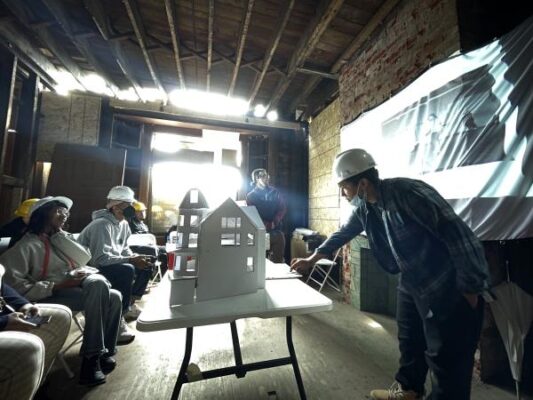News
Mellon Foundation awards Spitzer School $1.5M for multidisciplinary community-based incubator
The City College of New York is the recipient of a three-year $1.5 million grant from the Mellon Foundation to support a new multidisciplinary Place, Memory and Culture Incubator (PMCI) in the Bernard and Anne Spitzer School of Architecture. The incubator’s focus will be community-based partnerships and projects in Harlem that engage built-environment design and the humanities through a social-justice lens.
City College President Vincent G. Boudreau thanked the Mellon Foundation for the grant and lauded the Foundation’s long-running support of CCNY programs, faculty, and students. This is the first Mellon grant for the Spitzer School.
“This latest project recognizes the historic positioning of the Spitzer School of Architecture in the Harlem community as well as our commitment, in the architectural field and elsewhere in the college, to acknowledging, preserving and democratizing access to the important physical and cultural legacies of this place,” said Boudreau.
The incubator, he added, will provide a space and a methodology for members of the CCNY community — academic and neighborhood — to engage with one another in the production of more representative and authentic histories.
Marta Gutman, dean of the Spitzer School, said the PMCI will transform the ways in which architecture, landscape architecture, and urban design students engage communities, urban sites, and the past. Participating design studios may focus on recording, visualizing, and preserving heritage and projecting innovative, resilient cultural and spatial futures. She thanked the Mellon Foundation for providing the spark to light this ambitious project in full force.
The significant Mellon support will allow the Spitzer School to “diversify faculty, embed the humanities and the arts in the design studios, and create a new model for university and community partnerships based on reciprocal collaboration. Knowledge about place, memory, and culture will be co-produced with community partners and shared with the Harlem community via exhibitions, a symposium, a digital archive, and community-based public arts programs and installations,” said Gutman.
She will join Jerome Haferd, assistant professor of architecture, in directing the PMCI.
The PMCI’s potential community partners include: Broadway Mall Association, Harlem African Burial Ground, and Save Harlem Now!, among many others. In a letter of support for the proposal, President Valerie Jo Bradley of Save Harlem Now! stated, “We are particularly impressed with the proposal’s goal of creating an informative and accessible digital archive, providing funding and institutional support to community partners, and offering communities and universities an innovative model for collaboration among multiple stakeholders. Harlem is rapidly changing, and we need graduates with experience working in and with their local community to develop new design approaches informed by the cultural landscape that makes this place special and unique.”


